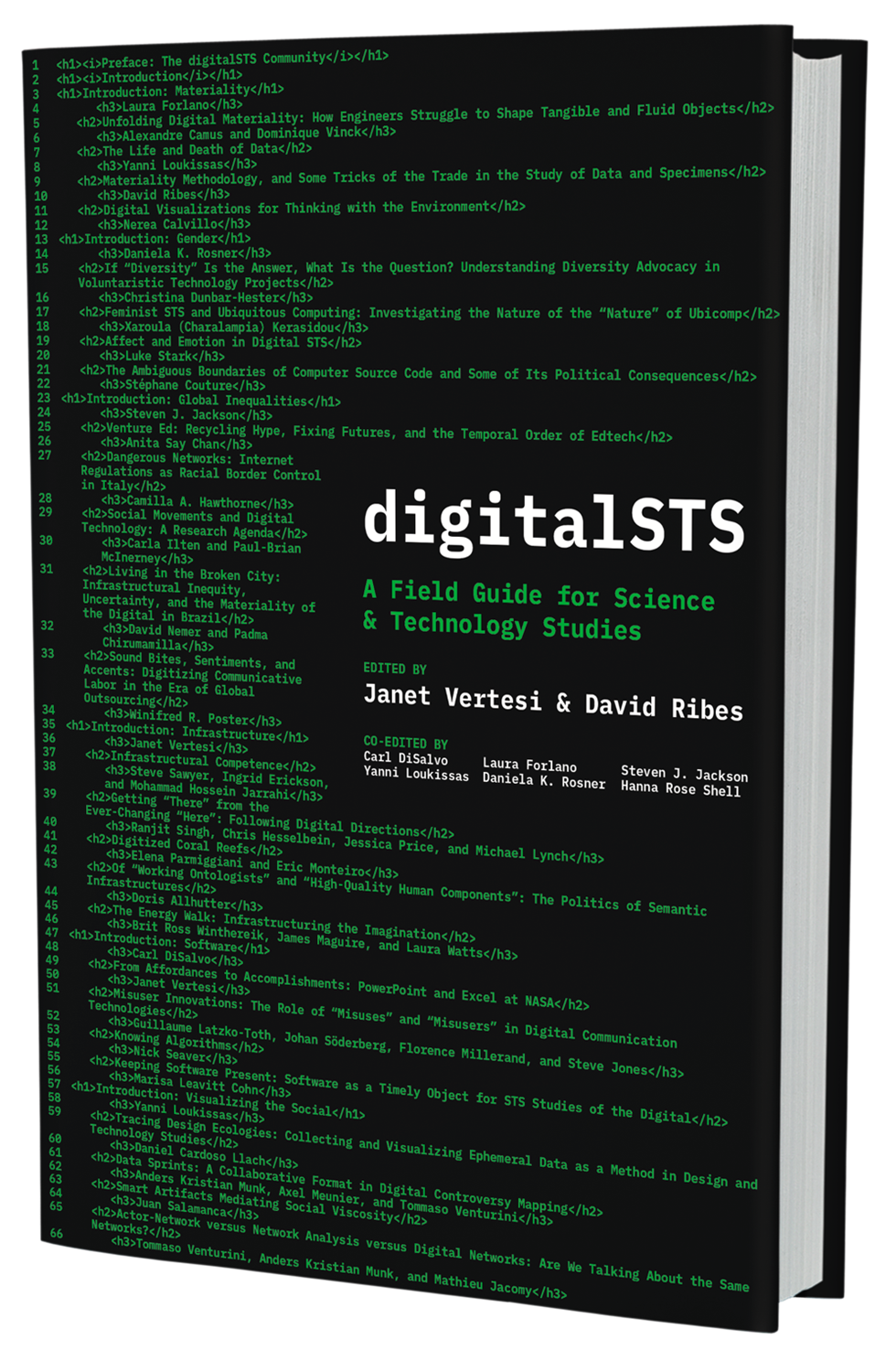
STS Infrastructure Award 2025: Digital STS
Acceptance Statement
The digitalSTS initiative is deeply honored to receive the 2025 STS Infrastructure Award from the Society for Social Studies of Science (4S). We thank the prize committee for this recognition and are grateful to the broader STS community for supporting and participating in the project over the past decade.
The digitalSTS initiative—first sparked at the 2011 4S meeting in Cleveland— grew into a vibrant, multimodal infrastructure for intellectual community building for scholarship of the digital. Initially a participant-driven panel that drew over 80 attendees to confront what was then a relatively underexplored area in STS—theorizing “the digital”—the initiative has since catalyzed workshops, panels, maker events, and ultimately, a collaboratively edited open access volume published by Princeton University Press: the digitalSTS Fieldguide. This book is both an artifact of scholarship and an infrastructural experiment in itself—produced through a custom-built open peer review platform and authored by 47 contributors, it embodies a model of inclusive and participatory scholarly practice.
Over five years of collective work, the dSTS team—led by David Ribes and Janet Vertesi and including Carl DiSalvo, Laura Forlano, Steven J. Jackson, Yanni Loukissas, Daniela K. Rosner, and Hanna Rose Shell—built a durable infrastructure for digital studies in STS. This included securing support and funding to fund workshops and events, provide travel support for early-career scholars, and develop the digital infrastructure to sustain open review and multimodal collaboration.
Through these efforts, dSTS brought together anthropologists, historians, sociologists, designers, and interdisciplinary researchers across ranks and roles. The initiative facilitated not only the production of new scholarship, but also the co-formation of a shared vocabulary and set of concerns for digital STS. It foregrounded the importance of hands-on engagement and experimental form, most memorably in what we believe may have been the first STS Maker event—organized at the Arnold Arboretum in Boston, where scholars and practitioners gathered to explore intersections between design, materiality, and theory.
The success of digitalSTS lies not just in a book or a platform, but in its cultivation of a lively, diverse, and collaborative community committed to rethinking the digital in STS. It is an infrastructure in the fullest sense: one that was built, maintained, shared, and inhabited together.
We accept this award not just on behalf of the editorial team, but in recognition of the full constellation of contributors—authors, reviewers, workshop participants, funders, and readers—who made the project possible. We hope the recognition further affirms our belief that infrastructuring is an ongoing, collective labor—one rooted in care, creativity, and critique.
Committee Statement
The digitalSTS initiative stands as a transformative contribution to community-building and intellectual infrastructure in science and technology studies. Emerging from a 2011 4S panel, digitalSTS cultivated a vibrant, interdisciplinary, and accessible network dedicated to theorizing digital artifacts, practices, and infrastructures. Over the past years, the team organized workshops, maker events, and an innovative open review process that brought together scholars across disciplines and career stages.
The culmination of these efforts, the open-access digitalSTS Field Guide (Princeton University Press), exemplifies this collaborative ethos. With contributions from 47 authors and support from major funders, the Field Guide not only reflects cutting-edge scholarship but also models new modes of open, inclusive academic publishing and innovative knowledge making beyond the reliance on STS canons.
Led by David Ribes, Janet Vertesi, Carl DiSalvo, Laura Forlano, Steven J. Jackson, Yanni Loukissas, Daniela K. Rosner, and Hanna Rose Shell—alongside a wide network of collaborators who later became authors of the Field Guide—digitalSTS created space for experimental scholarship, supported early-career researchers, and foregrounded digital topics in STS at a formative moment.
By infrastructuring a participatory, interdisciplinary, and open scholarly community, digitalSTS has reshaped how STS engages the digital. For its innovation, inclusivity, and lasting impact, digitalSTS is a most deserving recipient of the 2025 4S Infrastructure Award.
The 2025 STS Infrastructure Prize Committee included Yichen Rao (Chair), Michael Barany, Aalok Khandekar, Michaela Spencer, and Canay Ozden-Schilling.
2025: Digital STS
2024: Engaging Science, Technology, and Society (ESTS)
2023: Administrative and Editorial Pillars
2022: Administrative and Editorial Pillars of the Society and Field
2020: Catalyst: Feminism, Theory, Technoscience
2018: East Asian Science, Technology and Society: an International Journal (EASTS)
2017: Editors of the Handbooks of Science and Technology Studies
2016: WTMC (Netherlands Graduate Research School of Science, Technology and Modern Culture)

